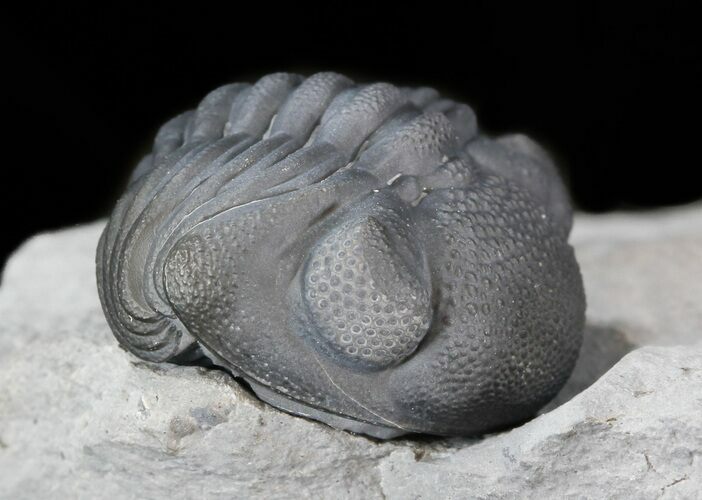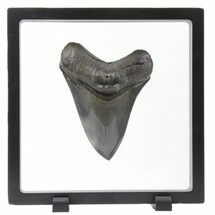This Specimen has been sold.
Enrolled Eldredgeops Trilobite In Matrix - New York
This is a detailed specimen of Eldredgeops rana rana from the Windom Shale of NY. Eldredgeops is often incorrectly referred to as Phacops. Great inflation and eye facets on this specimen.
The trilobite Eldredgeops gazed up at a vibrant oceanic world during the Devonian Age of Fish. These ancient arthropods are famous for the rich luster of their thick and well-preserved exoskeletons. The prominent shizochroal eye is an exquisite display of adaptation to the competitive life at the bottom of a sea exploding with diversity.
Eldredgeops have very large, separately set lenses without a common cornea. This compound eye is known as the shizochroal eye, and this style of sight is ideal for low light conditions. The unique shizochroal adaptation is characterized by up to 700 relatively large, thick lenses made of the purest calcite. A doublet system of mounted lenses within the eye reduced distortion, while perched eyes promoted a wide field of view.
Eldredgeops is a genus of the order Phacopida. They lived in the Middle Devonian faunal stage called the Givetian, which lasted from 387.7 ± 0.8 mya to 382.7 ± 1.6 million years ago. Phacopida means "Lens-face.” Members share a distinctive developmental stage lacking segments, called protaspis.
Shale of the Penn-Dixie, belonging to the Hamilton Group, contains shallow, tropical Devonian sea fauna. Along a creek in scenic western New York, Eldredgeops are often found enrolled. Prone specimens are a particularly prized treasure.
The Penn-Dixie dig site contains sediments deposited in an ancient Catskill basin of the Kaskaskian Sea. These sediments originated in the Acadian Mountains which were formed by the Acadian Orogeny when the Avalon landmass collided with North America. Penn-Dixie is on what were the western slopes of a near-equatorial tropical basin with a spectacular array of coral reef denizens.
Eldredgeops have very large, separately set lenses without a common cornea. This compound eye is known as the shizochroal eye, and this style of sight is ideal for low light conditions. The unique shizochroal adaptation is characterized by up to 700 relatively large, thick lenses made of the purest calcite. A doublet system of mounted lenses within the eye reduced distortion, while perched eyes promoted a wide field of view.
Eldredgeops is a genus of the order Phacopida. They lived in the Middle Devonian faunal stage called the Givetian, which lasted from 387.7 ± 0.8 mya to 382.7 ± 1.6 million years ago. Phacopida means "Lens-face.” Members share a distinctive developmental stage lacking segments, called protaspis.
Shale of the Penn-Dixie, belonging to the Hamilton Group, contains shallow, tropical Devonian sea fauna. Along a creek in scenic western New York, Eldredgeops are often found enrolled. Prone specimens are a particularly prized treasure.
The Penn-Dixie dig site contains sediments deposited in an ancient Catskill basin of the Kaskaskian Sea. These sediments originated in the Acadian Mountains which were formed by the Acadian Orogeny when the Avalon landmass collided with North America. Penn-Dixie is on what were the western slopes of a near-equatorial tropical basin with a spectacular array of coral reef denizens.
SPECIES
Eldredgeops rana rana
AGE
LOCATION
Penn Dixie Quarry, Erie County, NY
FORMATION
Windom Shale
SIZE
0.86" wide
CATEGORY
SUB CATEGORY
ITEM
#43799
We guarantee the authenticity of all of our specimens.
 Reviews
Reviews













